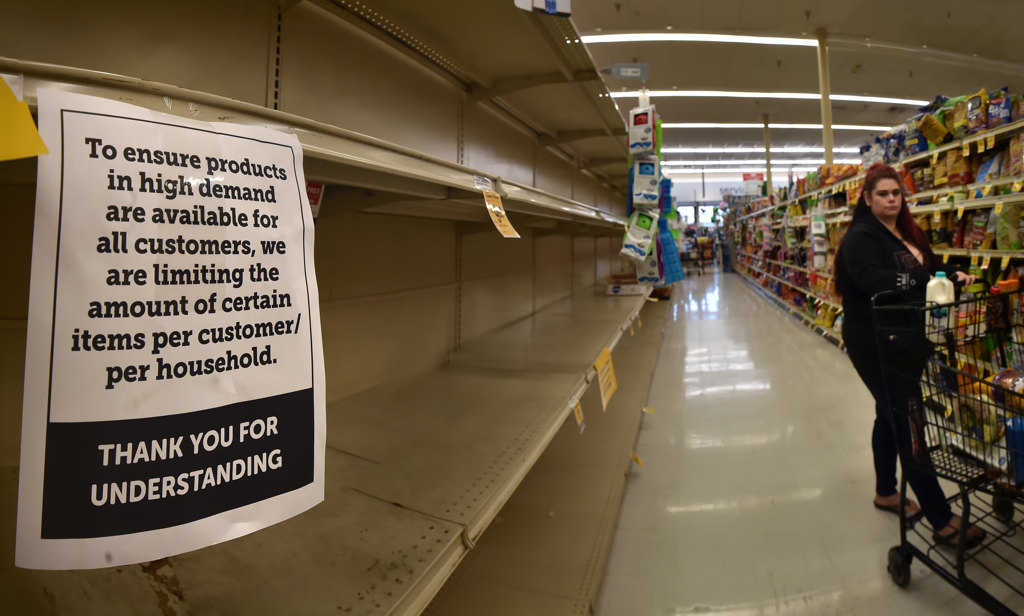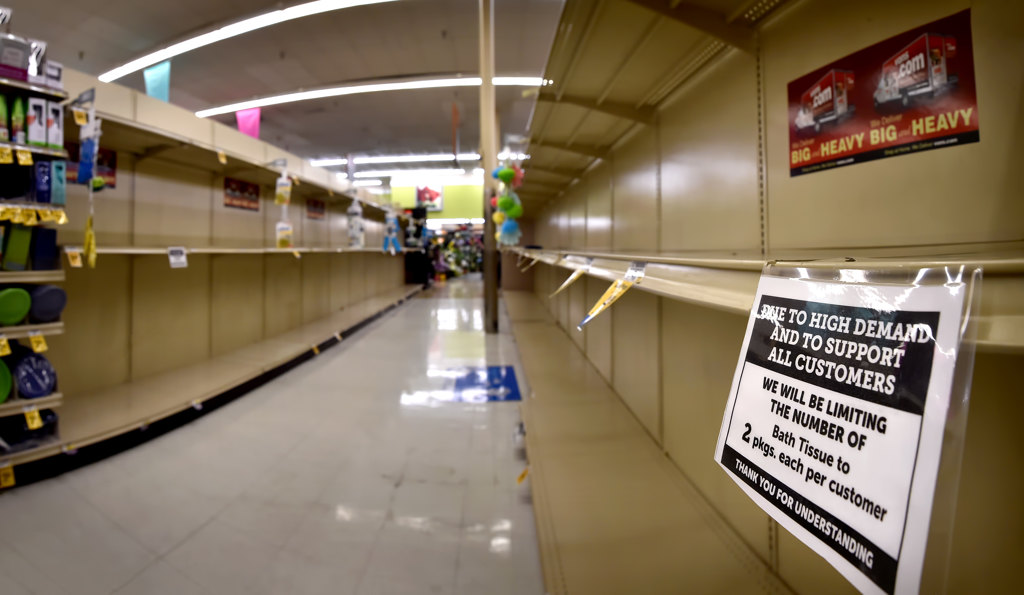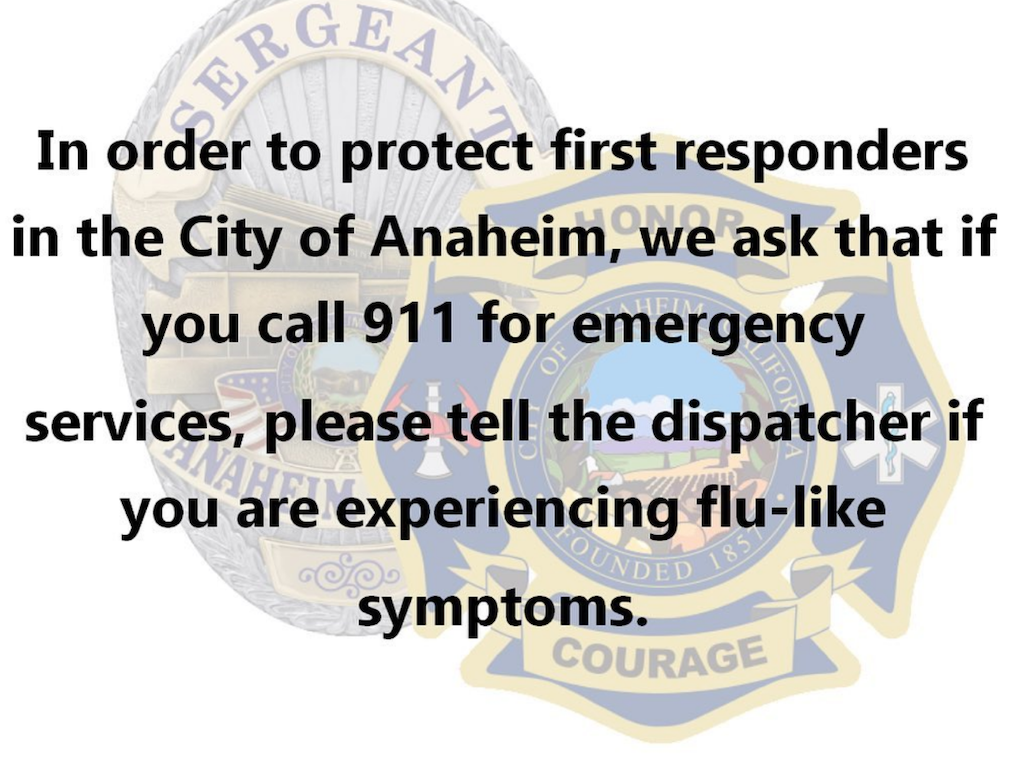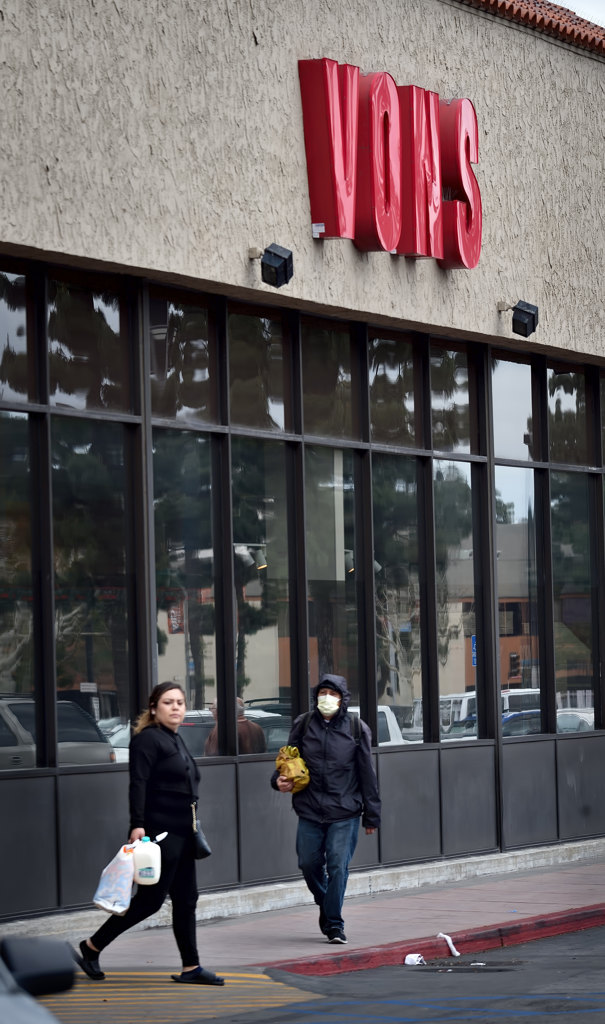Police not only face the risk of taking a bullet. Now they risk taking a cough to the face.
As society undergoes a paradigm shift for the time being to slow the spread of COVID-19, the disease caused by the coronavirus, law enforcement agencies in Orange County and other fire responders face the dual challenge of protecting themselves while calming a public drowning in anxiety and fear of the unknown.

Keeping many items on the shelves, including water, is proving difficult for many grocery stores, including a Vons on Lincoln Avenue in Anaheim.
Photo by Steven Georges/Behind the Badge
The Anaheim PD, for one, would like the community to know that the agency is doing what it can to protect its residents, business, and visitors during this unprecedented time. Please watch the video above, in which public information officer Sgt. Shane Carringer explains how the coronavirus epidemic is affecting how the APD continues to protect the city.
Meanwhile, here is an informative article about how first responders are being effected by the pandemic and coping advice for them.
HOW THE PANDEMIC AFFECTS FIRST RESPONDERS
Editor’s note: The following article appeared on policeone.com
By Amy Morgan
There are several ways COVID-19 will affect first responders related to mental health and well-being.
First, you’ll be interacting with people (just like you do already) whose personalities and experiences cause them to react somewhere on a scale between cynicism and annoyance, all the way to extreme panic and fear.
As a first responder, you will be seen as someone who should have the answers, and so you’ll get regular questions from people looking for information and trying to figure out how they should be reacting. Other people’s fear and panic can easily start a chain reaction, causing more fear and panic. As a responder, you’ll be interacting with this intense fear, and you need to know that this constant bombardment can have a negative effect on you.
The flip side is the cynicism and annoyance of people who aren’t prone to panic or fear, who may even be dismissive of the risk and are annoyed at all the fuss being made over the novel coronavirus. The comments can be negative rather than optimistic and hopeful. All of that negative talk can take its toll on a responder who hears it continually, especially when you’re having to converse and interact with these individuals.
The best way to care for yourself through the barrage of negativity – be it cynicism or fear – is to be as educated as possible about the risks, symptoms and precautions, and then stand your ground. Do everything you can to counteract the negative and the fear through finding positivity in your own life. Think about what you are grateful for so you can outweigh the intense “downward” thoughts people are having.
EXTRA RESPONSE MEANS EXTRA EXHAUSTION
Responding to other’s fears means you’re going to be working a lot harder. This may mean more calls on your regular shift, or it may mean extra shifts and longer hours. You already know this can cause exhaustion, so remind yourself you need to put extra effort into self-care.
Do what you can to get good sleep and focus on healthy eating and hydration. Taking care of yourself is not an extracurricular activity, it’s a necessity so you can keep taking care of others.
ANSWERING OTHERS WHEN YOU HAVE QUESTIONS
You’ll be seen as the source of information and answers to those who have fears, but how do you fill that role when you have so many questions yourself? Take the time to review factual information about COVID-19. Answering your own questions will prepare you to answer others. Being in a position to provide answers will give you a sense of control that a pandemic can easily take away.
STAY OPTIMISTIC AND HOPEFUL
It’s important to keep calm and resilient mentally, emotionally and physically. Do things to calm yourself like meditation and yoga. These activities lower your heart rate, relax your muscles and quiet your thoughts to give you a better sense of clarity and help you approach your role from a place of peace, rather than a place of mental chaos.
Don’t let the job take more from you than it already does – the longer hours and more intense concentration of calls are going to take a toll. Do other things in your life to take you away from your on-the-job role to provide much-needed balance.
Educate yourself, but don’t obsess watching the news and reading articles that amp up your stress and anxiety levels. Stay informed, but don’t let information overload create an additional burden on you.
FAMILY CONCERNS ARE REAL
A first responder’s family already has enough reason for worry on a regular basis, but knowing you’re leaving the house every day to enter a potentially risky health environment is a new stress.
When schools are being closed and the public encouraged to stay home as much as possible and not interact with people, your family may start to feel like your level of risk is too high for comfort. They’ll worry about you, and they’ll start asking more questions about your workday – where you’ve gone, who you interacted with and what precautions you’re taking. Reassure them by showing you are informed about the risk and that you’re taking every possible precaution to keep yourself healthy.

Empty shelves where toilet paper, and even paper towels, should be are a common site in grocery stores, including Vons on Lincoln Avenue in Anaheim.
Photo by Steven Georges/Behind the Badge
Family members may also fear all the germs you’re carrying with you as you go through your day, and then bring home. Take extra effort to reduce the amount of the “outside world” you bring into the home. This may mean undressing in the garage, taking off your shoes and going straight to the shower when you get home, rather than just walking in and grabbing your awaiting child for a big bear hug. Explain how you are looking out for your safety, and that you’re also looking out for theirs, and provide as much explanation as is appropriate to calm fears and create a feeling of security.
WHAT THIS MAY DO TO YOU
A public crisis can play on people’s emotions, including even the hardest and most cynical responders who have “seen it all.” If you start seeing signs in yourself or a coworker of increased agitation, anger, short temper, or a feeling of stress or panic, address it immediately. Not managed, these concerns can grow quickly and start causing ongoing challenges.
If the job is getting to you, and the heightened sense of crisis or panic is a little more than you were prepared for, use the resources available to you. Talk to a peer support person, use your EAP and call a counselor. Call a crisis line to vent and tell them all of your worries and concerns. Take the opportunity to let someone listen to you who won’t judge you.
If you start to show physical signs of illness, call your doctor. This isn’t the time to ignore symptoms or to be tough and feel like you’re immune to risk. Take good care of yourself so that you can keep taking care of others who aren’t as prepared as you.
Focus on the positive, know that these problems have solutions and remember you’ve already made it through a bunch of other really tough things. You’re going to make it through this also. Lean on those around you, and encourage them to lean on you. It’s a challenge, but taking really good care of yourself will help you and others make it through in a more positive way.
About the author
Amy Morgan is the founder and executive training director of Academy Hour, a training provider offering mental health and leadership courses to law enforcement, first response teams and public safety personnel. She is pursuing a PhD in Psychology, specializing in Trauma and Disaster Relief, has earned a Master’s degree in Counseling and holds a Bachelor of Science in Behavioral Sciences. She previously served as the training officer for the Oklahoma State Bureau of Investigation. She is TCCC (Tactical Combat Casualty Care)/LEFR (Law Enforcement First Responder) certified.
 Behind the Badge
Behind the Badge




